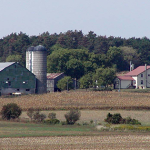Farmers Face Unique Challenges When Planning for Retirement
Planning for retirement can be a stressful and sometimes complicated proposition. While most Americans look forward to the day when they can kick back and enjoy some much deserved relaxation, farmers face unique challenges when it comes to retirement.
When most people retire, they look forward to downsizing. Often they move to a new, smaller home or even an apartment. Farmers on the other hand are unable to simply sell their home and move to the city. That’s because their house is usually on their farm and like everything else they have built up over the years, it is very much tied to the business side of the farm.
With life expectancies on the rise, farmers are at risk for a significant drop in their standard of living since savings can quickly run out. That is why it is so important that farmers map out a precise retirement plan. Although it can be an uncomfortable conversation, farmers must talk to their children about who can – and will – take over the farm operation after they have retired. If they don’t have children, they must arrange for the sale of their entire farm or decide how to break it up into segments that they can sell off individually.
If the farm is a multi-generational business there must be some flexibility since many farmers will still look to proceeds from the farm to support them during their retirement years. This means they don’t simply hand over the keys to the business and walk off into the sunset.Chances are that even in retirement a farmer will play some role in the farming operation. Further, some of the farm’s assets will need to be sold or otherwise employed to provide a steady retirement income.
Farmers face other unique challenges when planning for retirement, as well. The following are just a few of these challenges:
- The income of farmers is much more variable than most professions or trades since each new year brings with it unique challenges such as unfavorable weather conditions or market fluctuations. These factors often prevent farmers from consistently saving for retirement.
- Many farmers do not consider retirement an option. Farmers who have spent their whole life working the land from sunrise to well after sunset will not take kindly to being told they need to slow down. When surveyed, many farmers say they don’t have a retirement plan in place because they don’t plan on retiring.
- Rural communities where farmers live are less likely to provide access to social services for seniors. This is due to the fact that rural communities are far from major cities or towns.
While most farmers have a hard time coming to terms with retirement, it is important that they understand that at some point they may not have a choice. When and if this happens, the transition will be much easier with a plan already in place.


